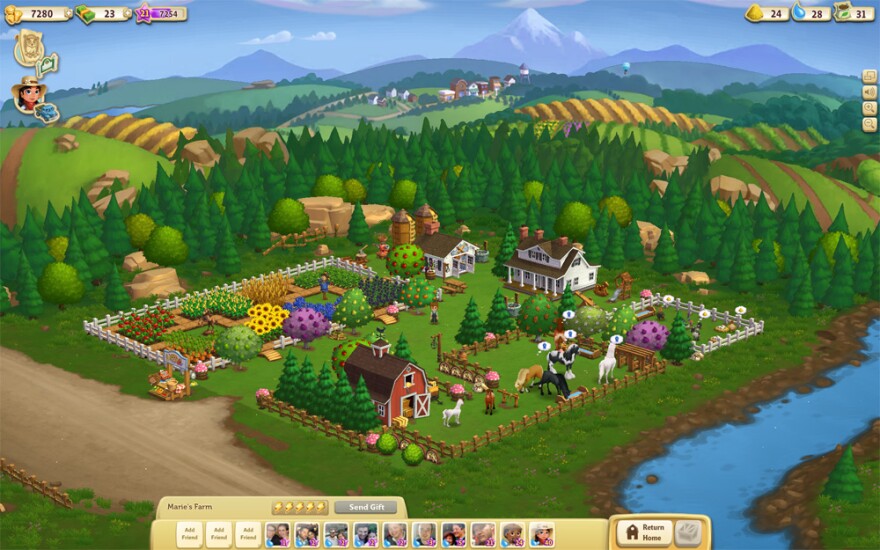The farm bill is, once again, entering a critical stretch. As was the case last year, the current law expires at the end of September. There’s no election to dissuade elected officials from tackling the major piece of agriculture and nutrition policy—but Congress does have a pretty full plate, with the crisis in Syria, immigration reform and a measure to continue funding federal government programs all set to come to a head.
The farm bill may be buried under competing priorities, but it’s a massive bill that charts policy for everything from farm subsidies to food stamps. To get non-farmers up to speed on the farm bill, blogger Val Wagner wrote “If Farmville had a Farm Bill” from her farm in North Dakota.
Farmville is the Facebook game that six million people play every day, clicking the mouse to plant some seeds and water them. Then players watch the crops roll in.
“If you look at the basic premise behind the game, it’s set-up very similar to some of the farm bill’s provisions,” Wagner said. “I mean, very, very basic, but at least it gives them an idea of where it all comes from and the whole point behind it.”
Wagner says safeguards are one parallel between the game and farming under the farm bill. If you follow the rules and check in on your farm, at least sparingly, you don’t get obliterated from the game.
“If you come back within the amount of time that they allot, you’re guaranteed at least a partial of what you were expecting,” Wagner said.

Similarly, the real farm bill’s crop insurance provisions give real-life farmers something to fall back on after a bad season. And that’s how, for decades, the farm bill has used policies that help farmers stay in business to encourage domestic food production.
Now, though, the rules of the game are unclear. The House and Senate have different ideas about conservation requirements. They are billions of dollars apart on nutrition assistance—in fact, the House completely separated farm policy from food stamps. Details about crop insurance subsidies, target prices and programs for new farmers all remain in flux.
“If our current farm bill situation was a game,” Wagner said, “you [would] basically have the developers saying, ‘Hey, we know you need to play the game and we want you to be here to play the game, but we’re not going to tell you how you’re going to play the game, and what it’s going to cost to play the game. And whether or not we’re actually going to have rules in place that will work for you.’”
Who wants to play such a game? Gamers would be outraged if Farmville changed its rules without warning and Wagner says farmers would rather not put up with it. But now they are heading into the harvest without knowing what the rules will be in 2014 and beyond. Wagner said that makes it difficult to know what to do with certain acres this fall, since she and her husband don’t have all the information they need to decide what they will plant come spring.
During the August Congressional recess, voters in farm country gave elected officials an earful on the subject. Rep. Bruce Braley, D-IA, held constituent meetings in several towns in his northeastern Iowa district.
“One of the biggest concerns people expressed is frustration that Congress can’t get a farm bill passed,” he said during a stop in Marshalltown. “And I understand that frustration. I’m frustrated.”
Iowa farmer Seth Watkins is one of the many Midwest farmers left in limbo. Dickcissels, field sparrows and common yellow throats chirp and fly over Watkins’ farm in the rolling hills of southwest Iowa, where Watkins has a cow-calf operation and grows corn, soybeans and a little wheat. Watkins is waiting on Congress because he will have to manage his farm under its new rules.
“Watching the farm bill, there’re certainly some things I don’t understand and might not even agree with,” Watkins said. “But there’s some things that I think benefit all of us.”
He cites the farm bill’s conservation reserve program as an example of a public-private partnership that works. But will it exist next year? Congress could axe it. And that would make Watkins’ decision to take land out of production more expensive.
You won’t find that level of detail in Farmville. But the game’s makers hope people do learn that a farm is a living entity and that farmers rely on their wits and hard work, on their neighbors, and on rules that make sense. Daryl Anselmo, a creative director at Farmville’s parent company Zynga, understands something that Congress seems to be ignoring.
“Players, when they come in, they want to understand the rules of the game,” he said. “And they want to be able to trust that certain decisions that they make will yield certain outcomes.”
If players don’t like what happens, they can easily leave the game. In real life, farmers take on plenty of risks, including losing their livelihood if things go terribly wrong. But federal policy is supposed to be something they can count on—because walking away from a real farm carries many more consequences than quitting a game.
Harvest Public Media, based at KCUR, is a collaboration of public radio stations across the Midwest.




